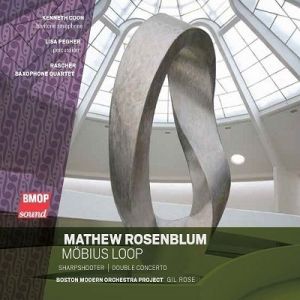Second Inversion hosts share a favorite selection from this Friday’s playlist. Tune in during the indicated hours below on Friday, July 15 to hear these pieces. In the meantime, you’ll hear other great new and unusual music from all corners of the classical genre 24/7!
Mathew Rosenblum: Sharpshooter from Mobius Loop Gil Rose/Boston Modern Orchestra Project (BMOP/sound)
 At first listen, Mathew Rosenblum’s tonal language and style in Sharpshooter seemed pleasant, if unremarkable. However, as I dug into this piece, I realized that Rosenblum has woven microtonality throughout this piece so deftly that it seems an organic outgrowth of the musical expression, rather than a conscious “technique.” Integrating microtonality so successfully is a remarkable achievement. Additionally, Rosenblum’s use of repeating structures firmly plants this piece tantalizingly close to the leading edge of post-minimalism. If there were any more variety here, the post-minimalist label would be useless. In Sharpshooter, Rosenblum is clearly on the verge of what is next, whatever that is. – Seth Tompkins
At first listen, Mathew Rosenblum’s tonal language and style in Sharpshooter seemed pleasant, if unremarkable. However, as I dug into this piece, I realized that Rosenblum has woven microtonality throughout this piece so deftly that it seems an organic outgrowth of the musical expression, rather than a conscious “technique.” Integrating microtonality so successfully is a remarkable achievement. Additionally, Rosenblum’s use of repeating structures firmly plants this piece tantalizingly close to the leading edge of post-minimalism. If there were any more variety here, the post-minimalist label would be useless. In Sharpshooter, Rosenblum is clearly on the verge of what is next, whatever that is. – Seth Tompkins
Tune in to Second Inversion in the 10am hour today to hear this recording.
Tess Said So: “11-15” from Scramble + Fate (Preserved Sound Records)
If you’re looking for a gateway to classical music, or really, if you’re just looking for great music, I’d recommend Tess Said So’s recent release, Scramble + Fate. Tess Said So is an Australian duo featuring One Piano Player (Rasa Daukus) and One Percussionist (Will Larsen) who “adapt a pop sensibility to a classical format.” The track “11-15” has their signature composed, classical foundation peppered with refreshing pop-ballad flavors. It’s not too simple and it’s not too complex. The opening calm, slowly moving piano melody breaks way into piano onstinatos splashed with percussion, progressively building with a concluding recap to the opening. I feel a sense of nostalgia, and a slower reflection on what was once the present. – Maggie Stapleton
Tune in to Second Inversion in the 12pm hour today to hear this recording.
Corey Dargel: “Removable Parts” from Someone Will Take Care of Me (New Amsterdam Records)

When you’re in a relationship, you have to make sacrifices—and sometimes you lose pieces of yourself in the process. If you’re Corey Dargel, those pieces are quite literal.
“Removable Parts” is the title of Corey Dargel’s 10-part art song cycle about amputation fetishism. Yes, you read that correctly. Each song reimagines the sacrifices made in relationships as actual physical bodily amputations, with Dargel’s vocals drifting sarcastically above sappy piano and toy piano melodies. It’s like a collection of satirical love songs—radical, fanatical, and unapologetically self-indulgent.
And honestly, that’s pretty in tune with the rest of Dargel’s compositional discography. He writes electronic art songs which draw from contemporary classical and pop music idioms, combining deadpan vocal delivery with pulpy lyrics and deceptively cheery chamber music accompaniment.
Maybe it’s just my weird sense of humor, but I think it’s hilarious and original. Corey Dargel may have lost all his limbs and extremities, but at least he’s still got personality. – Maggie Molloy
Tune in to Second Inversion in the 6pm hour today to hear an excerpt from this recording.






